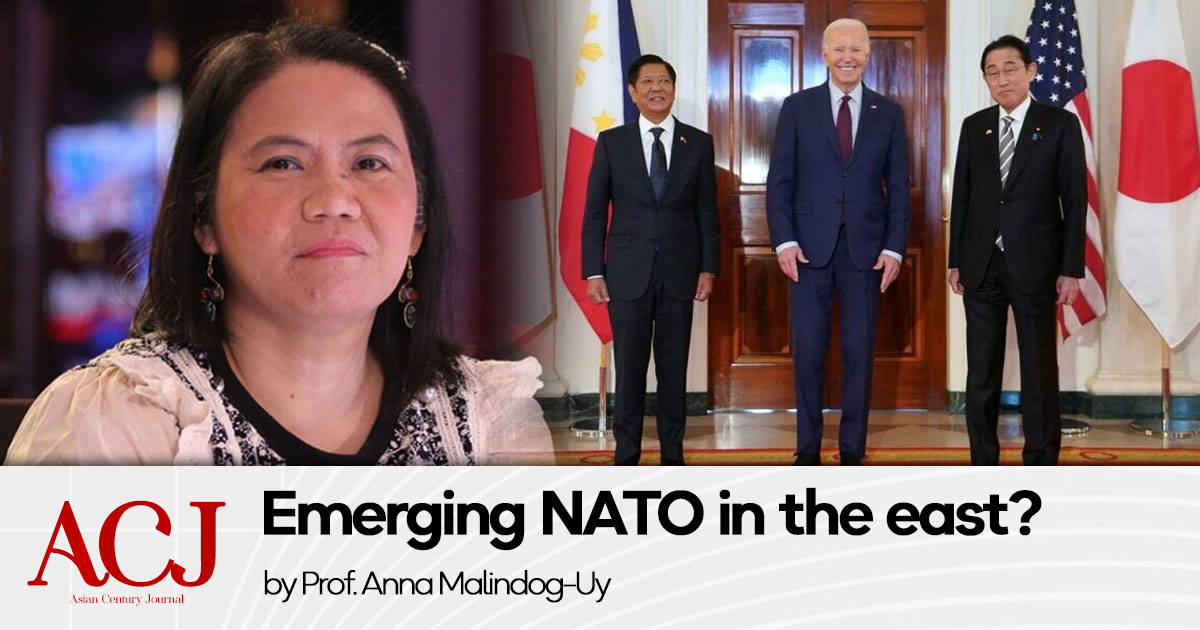
The chief architect of Philippine foreign policy is the President.
It appears that the sitting President has been somewhat slow in defining it but certainly he knows that buck of responsibility stops with him.
Since he took over, his student council cabinet secretaries, and his ambassador to Washington DC, have tried to create a deflection to show their preference some other way, but in the APEC summit in Thailand, he personally told the President of the Peoples Republic of China and the world where that foreign policy is dominantly anchored.
Ferdinand Romualdez Marcos Jr. reaffirmed his stand on the South China Seas issues, and stressed his consistent view that relations between the two countries should not be defined by maritime issues and that both sides may further enhance communication in this regard.
In this regard, both the Philippines and China also “reaffirmed their support for the early conclusion of a Code of Conduct on the South China Sea to help manage differences and regional tensions.”
The Philippine president will continue to adhere to the one-China policy, uphold the principle of peace, stay committed to an independent foreign policy, and will not take sides (between China and the United States).
“Our foreign policy refuses to fall into the trap of a Cold War mindset. Ours is an independent foreign policy guided by our national interest and commitment to peace,” Marcos told Xi during the meeting.
Moving forward, he told the Xi Jing Pin, the Philippines looks forward to working with China to unleash potentials and expand cooperation in such areas as infrastructure, energy, agriculture and people-to-people exchanges, in an effort to build a more robust and strong bilateral relationship.
At that, he said the Philippines is ready to engage in active consultations with China and find ways to advance the joint exploration of maritime oil and gas resources.
Quick Test of Resolve
Returning from Thailand, the President was confronted by loaded questions asking his thoughts on the Chinese Ministry of Foreign Affairs statement that the Philippines and China should “work together to reject unilateralism and acts of bullying, defend fairness and justice, and safeguard peace and stability in the region.”
The quote was in connection with the impending visit of US Vice President Kamala Harris to the province closest to the South China Sea where the Philippines and China have overlapping claims.
PBBM quickly diffused the pressure from media saying it would not stoke tensions between the two countries.
The President did not dwell on China’s call to “reject acts of bullying” as he interpreted it as upholding the region’s independence.
Instead of contradicting China, he said, “I suppose maybe the term bullying is not exactly accurate but I would characterize it as something different. I would say that as part of our foreign policy and this is something again that I spoke to our other partners with, what we really should pursue is that we should make sure that we in the region are the ones who will decide the future of the region.”
In the wider scale, Marcos Jr explained, “Huwag nating pabayaan na dinidiktahan tayo ng kahit sino… (Let us not allow anyone to dictate on us.) That has always been my formulation.”
The Harris visit is of course part of the United States’ lobby machine and public relations ramp up, since the new president took over last July, to create an international perception that the western hegemon is back in business in the Philippines.
The Philippine Ambassador to the US, took advantage of the transition from Duterte to Marcos Jr. to create dissonance that the Philippines contract with Russia on the supply of heavy-duty helicopters “could trigger” the United States into including the Philippines in the sanctions against Russia.
Immediately, Manila’s “presstitutes” started circulating photographs of American Boeing CH-47 Chinook that could possibly replace the Russian Mi-17s helicopters. Unfortunately, Manila has already made a $32m down payment to the deal.
As recent as last month, the Russian ambassador to the Philippines, Marat Pavlov, told local media that his government had not been officially informed of the contract cancellation and considered the helicopter deal valid.
No further development has been reported except that Marcos Jr. said “Unfortunately, we made a down payment (to the Russian manufacturer) that we are hoping to negotiate to get at least a percentage of that back.”
Last month, Ambassador Mary Kay Carlson told a media briefing aboard the USS Ronald Reagan, which was on a scheduled port call in Manila, “The United States has made available $100 million in foreign military financing in part for the Philippine military to use as it wishes,”
Carlson added the Philippines could use the allocation to “offset” its decision to scrap a 12.7 billion ($227.35 million) deal with Russia and buy heavy-lift Chinooks from the United States.
In short this is not a grant but a loan favoring an American arms supplier.
The Harris visit builds up decibels to earlier announcement that the Philippines and United States military are planning to build five facilities across Luzon to improve both countries’ joint trainings and disaster response capabilities under the Enhanced Defense Cooperation Agreement (EDCA).
Department of National Defense (DND) Officer-in-Charge Jose Faustino Jr. said will be an addition to the five previously approved sites that are now undergoing construction.
Faustino however clarified that the EDCA sites will not be used as military bases by the US since it is not allowed under the Constitution. It will also not be used to store weapons of mass destruction like nuclear weapons, easing the fears of the public.
Two of the target sites will be built in Cagayan, and one each in Palawan, Zambales, and Isabela, according to Armed Forces of the Philippines (AFP) chief Lt. Gen. Bartolome Vicente Bacarro.
Faustino and Bacarro are of course caught in the narrow agenda of military modernization, oblivious of the serious implications of EDCA, or for that matter any military alliances with the United States, like the Mutual Defense Treaty and the Visiting Forces Agreement, given today’s geopolitics.
Faustino and Bacarro are being used in the American lobby to ensure the lives of these alliances, with that of EDCA expiring its ten-year term on 2024, with the option of the service of notice for its cancellation as early as five months from now on April 28, 2023.
In an event of a confrontation between United States and China (or any foreign power for that matter), philosophers will not argue whether the Americans have established permanent bases here or are merely using Philippine bases for whatever their purposes is.
Even an American warship or military aircraft parked anywhere in the Philippines could serve as a sitting duck for a foreign attack by any of the United States many enemies.
American bullying
The Americans in Mindanao have situated themselves there in order to provide “eyes and ears” to ensure that their “rules-based freedom of navigation” (FON) in the Sibutu Straits is protected.
Harris goes to Palawan to condition our people of their same malevolent intentions in the South China Seas. Her visit is actually a dirty finger aimed at China. The United States is not in-country for what is best for the Philippines but purely for their own vested interests. They always fight their wars elsewhere than their own territory.
In a very real sense the Chinse Ministry of Foreign Affairs was not out of line, as Rappler’s fake report so easily suggests.
The United States engages in lawfare to dilute international law and impose its own hegemonic interpretations on the conduct of nations, especially pertaining to the seas.
What student council cabinet members of the PBBM administration incompetently gloss over, is that freedom of navigation is not the same as “innocent passage” as provided for in the United Nations Convention on the Laws of the Seas which was codified in 1958 and affirmed in 1982.
Innocent passage concedes the coastal country’s territorial sea claim, unlike freedom of navigation, which directly contests it.
Read Joseph A. Bosco’s “Are Freedom of Navigation Operations and Innocent Passage Really the Same?” which was featured in The Diplomat on March 13, 2016, and Reuters “U.S. destroyer challenges China’s claims in South China Sea” appearing August 10, 2017.
The United Nations Convention on the Law of the Sea Article 19 defines innocent passage as “innocent so long as it is not prejudicial to the peace, good order or security of the coastal State. Such passage shall take place in conformity with this Convention and with other rules of international law.”
Quoting its caveat verbatim, “Passage of a foreign ship shall be considered to be prejudicial if it engages in any of the following activities:
“(a) any threat or use of force against the sovereignty, territorial integrity or political independence of the coastal State, or in any other manner in violation of the principles of international law embodied in the Charter of the United Nations;
“(b) any exercise or practice with weapons of any kind;
“(c) any act aimed at collecting information to the prejudice of the defense or security of the coastal State;
“(d) any act of propaganda aimed at affecting the defense or security of the coastal State;
“(e) the launching, landing or taking on board of any aircraft;
“(f) the launching, landing or taking on board of any military device;
“(g) the loading or unloading of any commodity, currency or person contrary to the customs, fiscal, immigration or sanitary laws and regulations of the coastal State;
“(h) any act of willful and serious pollution contrary to this Convention;
“(I) any fishing activities;
“(j) the carrying out of research or survey activities;
“(k) any act aimed at interfering with any systems of communication or any other facilities or installations of the coastal State;
“(l) any other activity not having a direct bearing on passage.”
We will deal with this matter with more details in my next column.

Adolfo Quizon Paglinawan
is former diplomat who served as press attaché and spokesman of the Philippine Embassy in Washington DC and the Philippines’ Permanent Mission to the United Nations in New York from April 1986 to 1993. Presently, he is vice-president for international affairs of the Asian Century Philippines Institute, a geopolitical analyst, author of books, columnist, a print and broadcast journalist, and a hobby-organic-farmer.
His best sellers, A Problem for Every Solution (2015), a characterization of factors affecting Philippine-China relations, and No Vaccine for a Virus called Racism (2020) a survey of international news attempting to tracing its origins, earned for him an international laureate in the Awards for the Promotion of Philippine-China Understanding in 2021. His third book, The Poverty of Power is now available – a historiography of controversial issues of spanning 36 years leading to the Demise of the Edsa Revolution and the Forthcoming Rise of a Philippine Phoenix.
Today he is anchor for many YouTube Channels, namely Ang Maestro Lectures @Katipunan Channel (Saturdays), Unfinished Revolution (Sundays) and Opinyon Online (Wednesdays) with Ka Mentong Laurel, and Ipa-Rush Kay Paras with former Secretary Jacinto Paras (Tuesdays and Thursdays). His personal vlog is @AdoPaglinawan.
Email: contact@asiancenturyph.com
Facebook: https://www.facebook.com/asiancenturyph/
Twitter: https://twitter.com/AsianCenturyPH





Leave a Reply